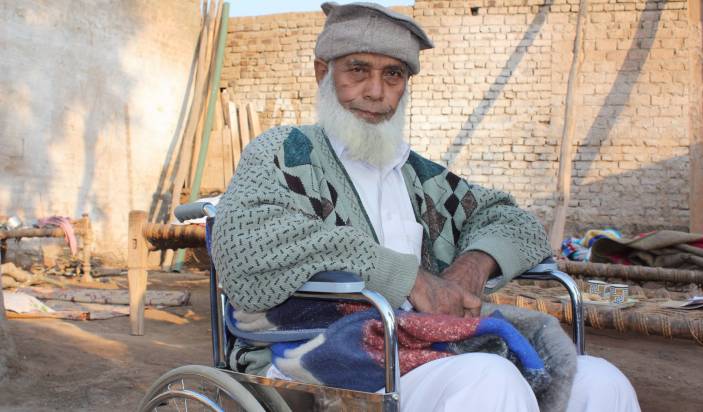Find out about HelpAge International's humanitarian policy and what we advocate for older people who are caught up in emergencies.
Humanitarian advocacy and policy
Find out about HelpAge International's humanitarian policy and what we advocate for older people who are caught up in emergencies.
Commitment to the principles of humanitarian action requires agencies to deliver assistance impartially, to focus on the most vulnerable and ensure they are included in assistance. This means everyone involved in humanitarian response has a responsibility to ensure all those affected, including older people, receive the assistance to which they are entitled.
Through our humanitarian work, we work with national and international actors to help them fulfil these commitments by supporting them to adapt their policy and programming to include older people.
 (c) HelpAge International
(c) HelpAge International
There needs to be a greater understanding of older people’s needs in humanitarian policy.
The proportion of the population aged 50 and over in countries where conflict and disasters are more likely to occur, is expected to rise from 12.3 per cent (219.9 million) in 2020 to 19.2 per cent (586.3 million) in 2050. From earthquakes, hurricanes and flooding to violent conflict and health emergencies, evidence shows that older people are at particularly high risk in emergencies.
It is increasingly recognised that older people’s needs are not being adequately addressed in emergencies.
Working with humanitarians to address older people’s needs
Addressing the needs of the most vulnerable, including older people, cannot be an afterthought, and HelpAge is working to contribute to overcoming the risks of marginalisation older people face.
We have identified a number of areas in which change is most needed and are working with humanitarians to address these:
1. Data and evidence
Currently many assessments conducted during emergencies do not collect or analyse data on the number of older people affected by a crisis, or consult older people about their needs. We work with others to improve data collection practices, and conduct our own assessments so we know how older people have been affected by crises. We also carry out research to fill gaps in current understanding of the needs and risks faced by older men and women.
2. Capacity and guidance
For many humanitarians a lack of understanding of older people’s needs or knowledge of how to address them is a major challenge. We have developed technical guidelines and training materials, and we deliver training and provide technical support. We also second our expert staff to other agencies to ensure they have the knowledge they need to support older people.
3. Funding and donor policy
We analysed the findings of assessments of the needs of older people in humanitarian emergencies, drawing on the voices of 8,883 people aged 50 to 80 affected by natural disasters of conflict. carried out by HelpAge International in the 13 months to the end of 2019 in 11 countries in Africa, Asia, Latin America and the Middle East.It shows how older people, despite the risks they face during emergencies, are often marginalised and in some cases excluded by the humanitarian aid response. Consequently, humanitarian responses are not meeting older people’s basic needs; of the older people surveyed, 64 per cent did not have enough to eat and more than three-quarters (77%) had no income.To address this gap, we work with major humanitarian donors including ECHO, USAID and others, to support them to develop guidance for staff and mechanisms for assessing proposals that will ensure older people’s needs are not forgotten.
4. Coordination of response
At global and country level, we work closely with UN agencies and National Governments responsible for the coordination of humanitarian response so they can ensure older people are not neglected in responses.
As a global network HelpAge collaborates with a range of humanitarian actors to contribute to addressing older people’s needs. These partners include specialist disability agencies such as Handicap International and the Christian Blind Mission, members of the Red Cross Movement, including IFRC and ICRC, mainstream NGOs such as Islamic Relief, Concern World Wide and Christian Aid as well as members of the HelpAge Network.
